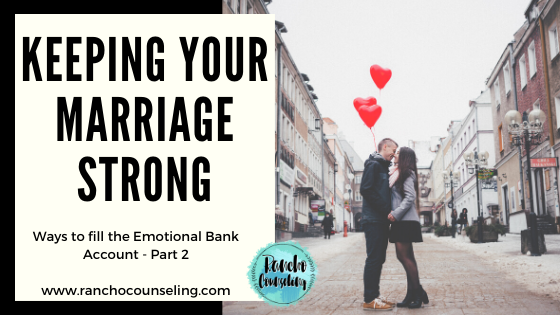Filling the Emotional Bank Account - Part 2
Have you been making bids for connection with your partner this past week? Do you have any idea what I’m talking about? If not, be sure to check out last week’s post where I discussed the Emotional Bank Account, and reciprocating bids for connection as a way to make deposits.
This week I’m going to give you three more ways to make those deposits. So without further ado, let’s just dive right in.
The second way to make deposits into the Emotional Bank Account is by speaking your partner’s Love Language.
Have you heard of The 5 Love Languages? It’s a great book, and an awesome concept by Gary Chapman. He teaches couples about the different ways to give love and to show love in relationships.
If you haven’t read the book, I’ll give you the quick Cliff’s Notes version: We all have ways that we give love and ways that we interpret love, and many times those two things are different, which is why it is important for us to understand the different languages.
The Five Love Languages are:
Gifts: you interpret your partner loves you when they give you gifts
Quality Time: you interpret your partner loves you when they spend time with you
Words of Affirmation: you interpret your partner loves you when they give you verbal compliments
Physical Touch: you interpret your partner loves you when they are physically affectionate with you
Acts of Service: you interpret your partner loves you when they go out of their way to do things for you such as making you a lunch, cleaning up around the house, etc.
If you haven’t already, you can go online to 5lovelanguages.com and take the quiz for free, and find out which one you most closely identify with. You also want your partner to take the quiz so that you can begin speaking one another’s love languages. When you show love in a way that your partner can hear, the results are so amazing! You feel heard and understood, and your connection will increase.
A third way to make deposits into the Emotional Bank Account is by creating a culture of appreciation in your home.
What I mean by this is, letting your partner know that you appreciate the little things they do and say.
It can be easy to point out the things they aren’t doing, and criticism can cloud the relationship, which is the opposite of what you want your partner to feel. By creating a culture of appreciation you are putting the things you appreciate at the forefront. Practice saying thank-you for the little things, let your partner know they are seen, and make deposits into the Emotional Bank Account.
The fourth way to make deposits into the emotional bank account is by nurturing your friendship.
We give our friends an awful amount of grace, but many times we aren’t so graceful with our partner.
For example, if you are going to meet a friend for a drink or coffee, and while you’re on your way your friend calls with an emergency, and says they aren’t going to be able to make it, typically you’d say, “ok, I hope everything is ok, and we’ll catch up next week.”
However, if you had plans to meet with your partner and you get a similar call, you may not be so nice in your response. (You can check out this post where I go more in-depth about this concept.)
I always ask the couples I work with what they are fighting about. When I hear responses like, “we fight over stupid little things,” or “we don’t even really know what starts the fights, they just seem to escalate,” my next questions are about ways they may or may not be nurturing their friendship.
When the friendship comes first, it’s easy to give grace, be forgiving, and not sweat the small stuff. If you’re looking for ways to nurture your friendship, think back to when you were first dating - what did you two like to do together? Get back to those things, or try new things. Get on Groupon or LivingSocial and find some new date ideas. Get out of your comfort zones together, laugh, and reconnect. This is the best way to build trust and connection.
If you and your partner seem to be missing the mark when it comes to filling the Emotional Bank Account, I’d love to hear from you. You can set up a phone consultation and we can talk about ways couples therapy might benefit you.

